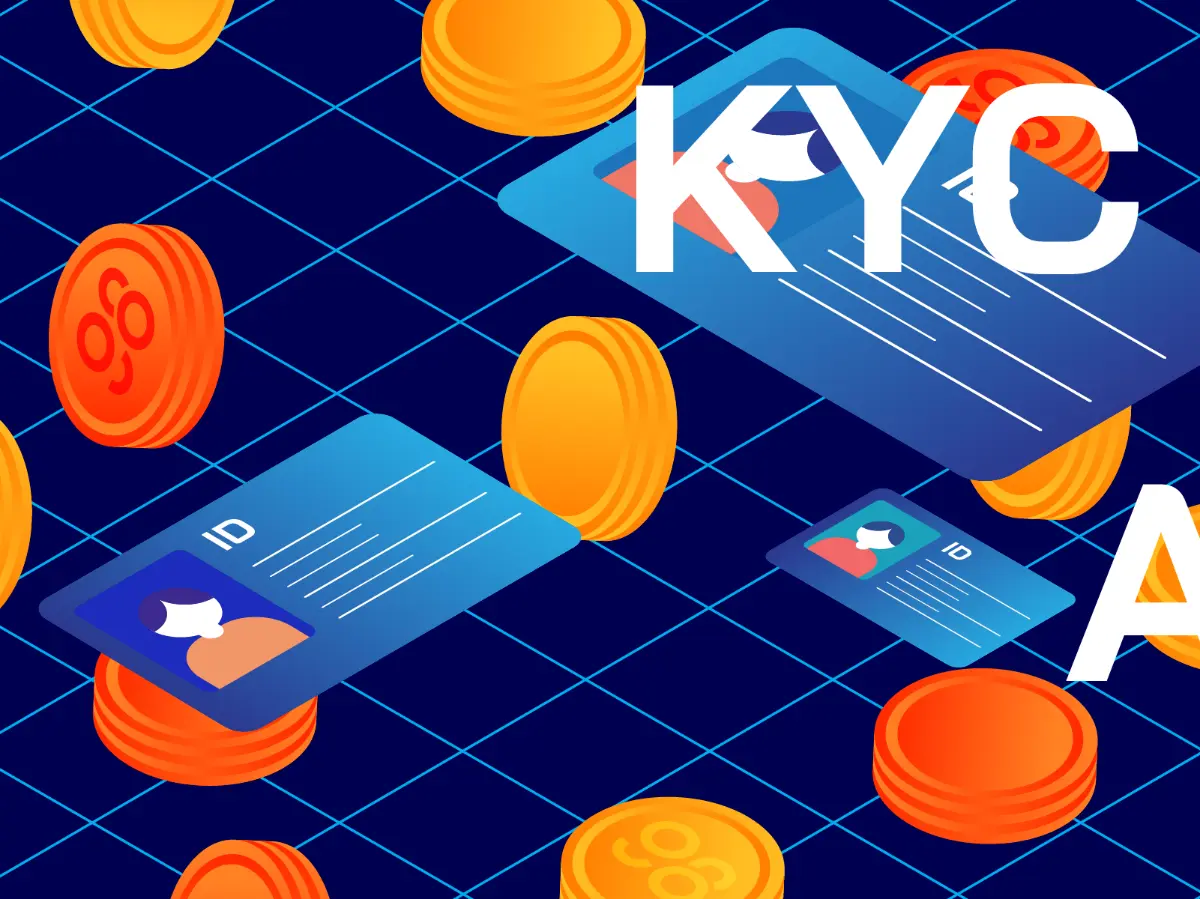What is KYC? How does KYC work in Cryptocurrency?

What is KYC?
KYC stands for “know your customer”. It is a process that financial institutions use to verify the identity of their customers. The KYC process helps businesses meet legal and regulatory requirements, as well as reduce the risk of fraud and money laundering.
It also helps businesses build trust with their customers by ensuring that they are who they say they are.

In the traditional financial world, KYC typically involves collecting some basic information about a customer, such as their name, address, and date of birth. The customer may also be required to provide proof of identity, such as a passport or driver's license.
In the cryptocurrency world, KYC often takes on a slightly different form. Exchanges may require customers to provide their full name, date of birth, and address. Some exchanges also require customers to upload a photo of themselves, as well as a selfie with their ID.
How does KYC work in Cryptocurrency?
When you sign up for a cryptocurrency exchange or wallet, you will usually be asked to complete Know Your Customer (KYC) verification. This involves providing the exchange or wallet with some personal information, such as your name, address, and date of birth. The exchange or wallet will then use this information to verify your identity.
The KYC process is designed to prevent money laundering and other financial crimes. By verifying your identity, the exchange or wallet can be sure that you are not using stolen funds or trying to launder money.
Steps to be done when going through the KYC process:
- Create an account on the exchange or wallet.
- Provide your personal information, such as your name, address, and date of birth.
- The exchange or wallet will use this information to verify your identity.
- If you are verified, you will be able to use the exchange or wallet to buy, sell, and trade cryptocurrencies.
Completing KYC verification can be a bit of a hassle, but it is generally quick and easy to do. Once you have been verified, you will be able to use the exchange or wallet without any problems.
Many exchanges and wallets including Binance, Coinbase, and Kraken offer KYC verification.
If you are looking to buy, sell, or trade cryptocurrencies, then you will need to go through the KYC process. By verifying your identity, you can be sure that you are not using stolen funds or trying to launder money.
Why do we need KYC?
The purpose of KYC is to prevent money laundering and other financial crimes. By identifying and verifying the identity of customers, banks and other financial institutions can help to ensure that they are not being used for criminal activities. KYC also helps to protect businesses from fraud and other risks.
- KYC ensures compliance with anti-money laundering regulations.
- KYC helps banks and financial institutions to identify and verify the identity of their customers.
- KYC is a necessary part of the customer due diligence process.
- KYC helps banks and financial institutions to build trust and confidence with their customers.
- KYC is an important part of the know your customer principle.
- KYC helps banks and financial institutions to protect themselves from reputational risk.
- KYC is an important element of good corporate governance.
What is KYC used for in Cryptocurrency?
Cryptocurrencies have been gaining in popularity in recent years. As more and more people invest in them, the need for regulations and compliance measures has become more important.
In many countries, businesses are required to collect KYC information in order to comply with anti-money laundering laws. By collecting and verifying this information, businesses can help the government track down and prosecute individuals who are engaged in illegal activities.
The need for KYC compliance measures has become more important. Cryptocurrency exchanges, for example, are required to collect KYC information from their users in order to comply with anti-money laundering laws. By collecting this information, exchanges can help the government track down and prosecute individuals who are using cryptocurrencies for illegal purposes.
KYC compliance is also important for businesses that accept payments in cryptocurrency. In order to comply with KYC guidelines, these businesses must collect customer information such as name, address, date of birth, and other identifying information. They must then take steps to ensure that this information is accurate and up-to-date.
By complying with KYC guidelines, businesses can help keep their customers safe from fraud and money laundering. Additionally, they can help the government track down and prosecute individuals who are using cryptocurrencies for illegal purposes.
If you're thinking about investing in cryptocurrency, make sure you understand the KYC compliance requirements of the exchanges you're dealing with. This will help you keep your investments safe and ensure that you're not inadvertently supporting criminals.
What does KYC require? What are common types of KYC?
The requirements for KYC normally are:
- Sufficient proof of identity: Passport, National ID card, or other government-issued ID.
- Proof of address: Recent utility bill, bank statement, or other official documents with your name and address.
- A clear photo: A passport-style photograph or selfie that clearly shows your face.
- Date of birth: To verify your age and prevent underage trading.
- Contact information: Email address and phone number.
These requirements may vary slightly depending on the exchanges you're using, but in general, this is the information that will be required for KYC.
If you're unsure about any of the requirements or have any questions, it's always best to contact the sites directly and they'll be able to help you out.
Advantages & Disadvantages of KYC
Advantages of KYC
When it comes to Cryptocurrency, the main advantages of KYC can be listed as follows:
- KYC can help to build trust with potential customers or investors, as it shows that a company is willing to be transparent about its operations.
- KYC can help to prevent money laundering and other financial crimes.
- KYC can help to ensure compliance with regulations.
Disadvantages of KYC
However, there are still some the disadvantages of KYC to be considered:
- KYC can be costly and time-consuming to implement.
- KYC can place a burden on customers or investors, who may have to provide extensive documentation in order to verify their identity.
- KYC can create privacy concerns, as personal information may be shared with third parties in order to verify identity.
Ultimately, whether KYC is advantageous or not depends on the specific organization and individual. However, in general, the advantages tend to outweigh the disadvantages.
Common steps of KYC
KYC steps vary from company to individual. However, there are a few common steps as follows:
- Step 1: Customer identification. The customer must provide their personal information, such as name, address, date of birth, and contact information.
- Step 2: Customer verification. The customer must verify their identity by providing supporting documentation, such as a government-issued ID or passport.
- Step 3: Risk assessment. The customer’s risk profile will be assessed based on factors such as their country of residence, source of funds, and transaction history.
- Step 4: Ongoing monitoring. Customers will be monitored for suspicious activity on an ongoing basis and may be required to provide additional information or documentation if their risk profile changes.
For customers who are deemed to be high risk, financial institutions may need to conduct enhanced due diligence, which could involve additional measures such as interviewing the customer or requiring them to provide more documentation.
Once a customer has been onboarded, financial institutions must then continue to monitor them for any changes in risk profile that could trigger the need for additional due diligence. This typically involves reviewing account activity on a regular basis and flagging any unusual or suspicious transactions.
The specifics of a KYC program will vary from a financial institution to a financial institution, depending on their risk appetite and the regulations they are subject to. However, all KYC programs must follow these four basic steps in order to be effective.
Conclusion
Cryptocurrency exchanges have been increasingly adopting know-your-customer (KYC) measures in order to comply with anti-money laundering (AML) regulations. This has caused some friction within the crypto community, with some arguing that KYC is a violation of privacy.
However, there are several good reasons why exchanges require KYC and especially in cryptocurrency, where anonymous transactions could be used for criminal activity.
I hope you have gained a better understanding of why cryptocurrency exchanges require KYC and the benefits it provides in terms of AML compliance.